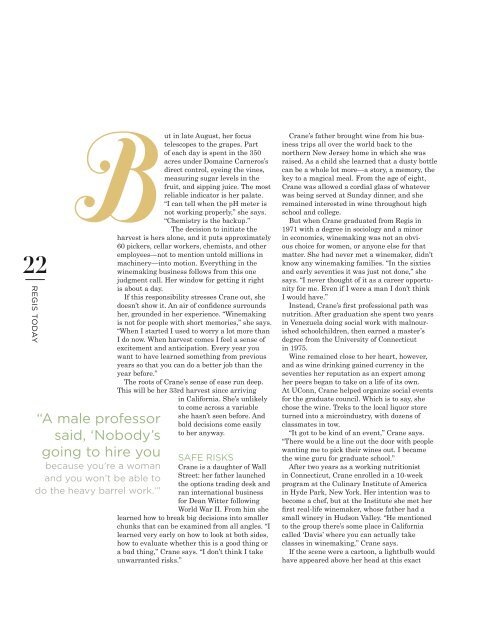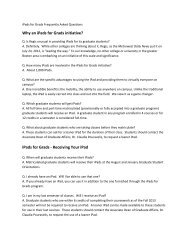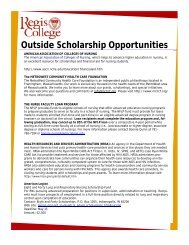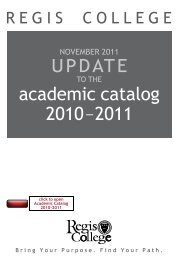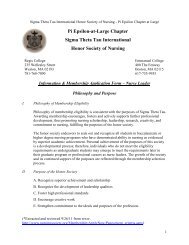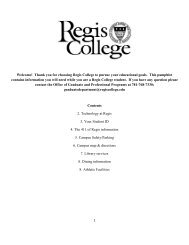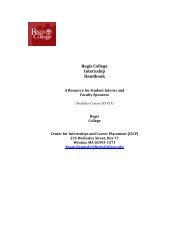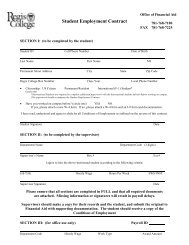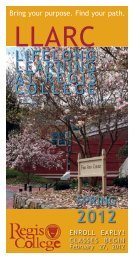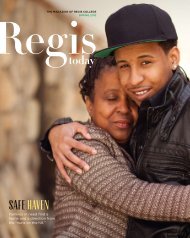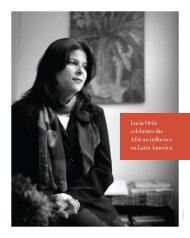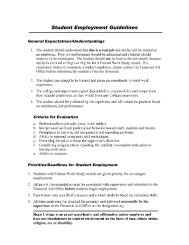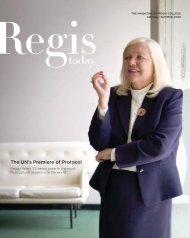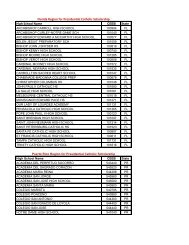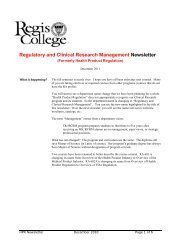Create successful ePaper yourself
Turn your PDF publications into a flip-book with our unique Google optimized e-Paper software.
22<br />
REGIS TODAY<br />
B<br />
“A male professor<br />
said, ‘Nobody’s<br />
going to hire you<br />
because you’re a woman<br />
and you won’t be able to<br />
do the heavy barrel work.’”<br />
ut in late August, her focus<br />
telescopes to the grapes. Part<br />
of each day is spent in the 350<br />
acres under Domaine Carneros’s<br />
direct control, eyeing the vines,<br />
measuring sugar levels in the<br />
fruit, and sipping juice. The most<br />
reliable indicator is her palate.<br />
“I can tell when the pH meter is<br />
not working properly,” she says.<br />
“Chemistry is the backup.”<br />
The decision to initiate the<br />
harvest is hers alone, and it puts approximately<br />
60 pickers, cellar workers, chemists, and other<br />
employees—not to mention untold millions in<br />
machinery—into motion. Everything in the<br />
winemaking business follows from this one<br />
judgment call. Her window for getting it right<br />
is about a day.<br />
If this responsibility stresses Crane out, she<br />
doesn’t show it. An air of confidence surrounds<br />
her, grounded in her experience. “Winemaking<br />
is not for people with short memories,” she says.<br />
“When I started I used to worry a lot more than<br />
I do now. When harvest comes I feel a sense of<br />
excitement and anticipation. Every year you<br />
want to have learned something from previous<br />
years so that you can do a better job than the<br />
year before.”<br />
The roots of Crane’s sense of ease run deep.<br />
This will be her 33rd harvest since arriving<br />
in California. She’s unlikely<br />
to come across a variable<br />
she hasn’t seen before. And<br />
bold decisions come easily<br />
to her anyway.<br />
SAFE RISkS<br />
Crane is a daughter of Wall<br />
Street: her father launched<br />
the options trading desk and<br />
ran international business<br />
for Dean Witter following<br />
World War II. From him she<br />
learned how to break big decisions into smaller<br />
chunks that can be examined from all angles. “I<br />
learned very early on how to look at both sides,<br />
how to evaluate whether this is a good thing or<br />
a bad thing,” Crane says. “I don’t think I take<br />
unwarranted risks.”<br />
Crane’s father brought wine from his business<br />
trips all over the world back to the<br />
northern New Jersey home in which she was<br />
raised. As a child she learned that a dusty bottle<br />
can be a whole lot more—a story, a memory, the<br />
key to a magical meal. From the age of eight,<br />
Crane was allowed a cordial glass of whatever<br />
was being served at Sunday dinner, and she<br />
remained interested in wine throughout high<br />
school and college.<br />
But when Crane graduated from <strong>Regis</strong> in<br />
1971 with a degree in sociology and a minor<br />
in economics, winemaking was not an obvious<br />
choice for women, or anyone else for that<br />
matter. She had never met a winemaker, didn’t<br />
know any winemaking families. “In the sixties<br />
and early seventies it was just not done,” she<br />
says. “I never thought of it as a career opportunity<br />
for me. Even if I were a man I don’t think<br />
I would have.”<br />
Instead, Crane’s first professional path was<br />
nutrition. After graduation she spent two years<br />
in Venezuela doing social work with malnourished<br />
schoolchildren, then earned a master’s<br />
degree from the University of Connecticut<br />
in 1975.<br />
Wine remained close to her heart, however,<br />
and as wine drinking gained currency in the<br />
seventies her reputation as an expert among<br />
her peers began to take on a life of its own.<br />
At UConn, Crane helped organize social events<br />
for the graduate council. Which is to say, she<br />
chose the wine. Treks to the local liquor store<br />
turned into a microindustry, with dozens of<br />
classmates in tow.<br />
“It got to be kind of an event,” Crane says.<br />
“There would be a line out the door with people<br />
wanting me to pick their wines out. I became<br />
the wine guru for graduate school.”<br />
After two years as a working nutritionist<br />
in Connecticut, Crane enrolled in a 10-week<br />
program at the Culinary Institute of America<br />
in Hyde Park, New York. Her intention was to<br />
become a chef, but at the Institute she met her<br />
first real-life winemaker, whose father had a<br />
small winery in Hudson Valley. “He mentioned<br />
to the group there’s some place in California<br />
called ‘Davis’ where you can actually take<br />
classes in winemaking,” Crane says.<br />
If the scene were a cartoon, a lightbulb would<br />
have appeared above her head at this exact


